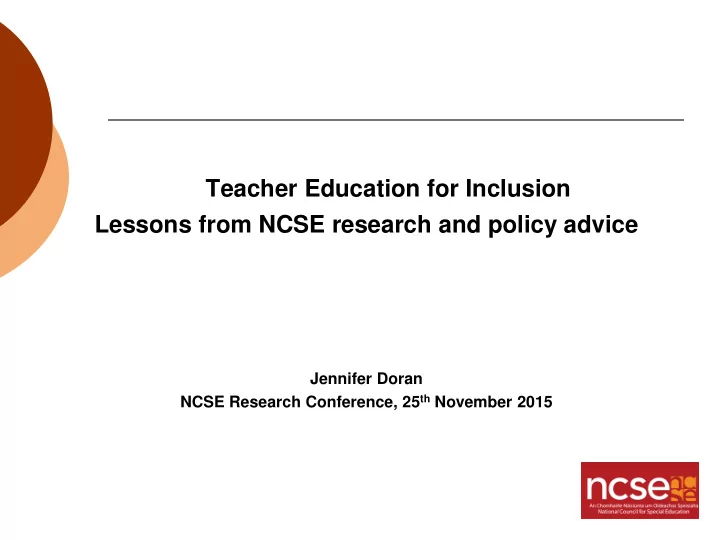

Teacher Education for Inclusion Lessons from NCSE research and policy advice Jennifer Doran NCSE Research Conference, 25 th November 2015
Why is teacher education so important? Most important factors in student outcomes- teachers and quality teaching. Appropriate training of mainstream teachers is ‘crucial’ in teaching children with diverse educational needs- principles of inclusion built into all teacher education programmes (WHO, 2011). Inclusive education is the responsibility of all teachers and preparing all teachers for work in inclusive settings is the responsibility of all teacher educators (EADSNE, 2012). NCSE international literature reviews echo these sentiments*. *Refer to full reference list
How prepared are teachers in Ireland? All students learn differently. Teachers need to know how students and those with SEN learn and how to teach and differentiate. One in four students with a learning or special educational need in every classroom in Irish schools (Banks and McCoy, 2011). *Our research tells us: Teachers feel unprepared to work with children with SEN following ITE (similar to international reports). Limited use of a variety of differentiation strategies in schools. Inconsistencies and challenges in planning and setting targets. Limited and inconsistent measurement of outcomes. *Refer to full reference list
How prepared are teachers in Ireland? What does this evidence tell us? Challenges for ITE Outcomes for students with SEN?
How prepared are teachers in Ireland? What about CPD? 87% (n= 764) resource/learning support teachers in mainstream schools had undertaken some professional development (varied enormously 2 hour session – masters degree). 63% had a specific qualification in SEN (O’Gorman and Drudy et al, 2011). *Yet other NCSE research tells us: CPD perceived to be limited and access varied. Teachers reported limited knowledge of specific teaching approaches. On-going challenges- planning, differentiation and review. *Refer to full reference list
How prepared are teachers in Ireland? What does this evidence tell us? Teachers still feel not adequately prepared. Challenges for CPD (content, access). Outcomes for students with SEN?
How have we considered these issues? NCSE Policy Advice Working Group Report- Delivering for Students with SEN (2014) Supporting Students with SEN in Schools (2013). The Education of Children with Challenging Behaviour arising from Severe Emotional Disturbance/Behavioural Disorders (2012). The Education of Deaf and Hard of Hearing Children in Ireland (2011). The Future Role of Special Schools and Classes (2011). Advice is informed by: Extensive consultations with parents; students; advocacy groups; teachers; principals; school management bodies; health and educational professionals; relevant government departments and agencies. NCSE and other research evidence.
NCSE Policy Advice Initial teacher education Teachers need to: Know about the needs of children with different types of SEN. Plan at whole class and individual level. Be able to differentiate. Know a variety of teaching methodologies. Assess for and of learning. Teach for literacy and numeracy. Know how to use ICT. Be equipped for organisational and administration duties. Standards based on these competencies. Mandatory components within ITE to address these with placement options in special settings.
NCSE Policy Advice Existing teachers- CPD Children with SEN in every classroom. Similar skills and knowledge as above. Specific issues for post-primary teachers: Nature and structure of the syllabus. Focus on state exams and preparing students. Organisational and class structure and timetabling. Additional support in teaching literacy and numeracy. Mandatory levels and frequency of CPD within overall framework of CPD.
NCSE Policy Advice Teachers in specialist roles and settings Additional knowledge, skills and competencies required. Professional development required to address complex and diverse needs. Mandatory levels and frequency of CPD with placement opportunities. Principals and deputy-principals Important role of leaders for whole school approach to inclusion and making students feel welcome. Ongoing programme of CPD for principals and deputy principals.
Context for New Research ITE Issues identified in our research and internationally. Developments in ITE. Major study to focus on: Content of ITE. How it prepares teachers to be inclusive (EADSNE Profile). Intended impact of changes on student outcomes. CPD Issues identified in our research and internationally. Developments in CPD (Cosán framework). Initial scoping exercise: Identify and classify suite of CPD. Content and availability of CPD. Bank of information in one place.
NCSE Reference List International Review of the Literature of Evidence of Best Practice Provision in the Education of Persons with Autistic Spectrum Disorders. (Parsons et al, 2009) Evidence of Best Practice Models and Outcomes in the Education of Deaf and Hard of Hearing Children: An International Review. (Marschark and Spencer, 2009) International Review of the Literature of Evidence of Best Practice Models and Outcomes in the Education of Blind and Visually Impaired Children. (Douglas et al, 2009) Evidence of Best Practice Models and Outcomes in the Education of Children with Emotional Disturbance/ Behavioural Difficulties: An International Review. (Cooper and Jacobs, 2010) Access to the curriculum for pupils with a variety of special educational needs in mainstream classes: An exploration of the experiences of young pupils in primary school. (Ware et al, 2011) A Study on the Prevalence of Special Educational Needs. (Banks and McCoy, 2011) Professional Development for Teachers Working in the Area of Special Education/Inclusion in Mainstream Schools. (O'Gorman and Drudy, 2011).
NCSE Reference List Measuring Educational Engagement, Progress and Outcomes for Children with Special Educational Needs. (Douglas et al, 2012) Curriculum and Curriculum Access Issues for Students with Special Educational Needs in Post-Primary Settings: An International Review. (O’Mara et al, 2012) Review of NCSE Resource Allocation Process and Evaluation of Deployment of Resources in Schools. (Kinsella et al, 2014) Inclusive Research in Irish Schools- A longitudinal study of the experiences of and outcomes for pupils with special educational needs (SEN) in Irish Schools. (Rose et al, 2015) An Evaluation of Education Provision for Students with Autism Spectrum Disorder in Ireland. (Daly and Ring et al, forthcoming) Understanding Special Class Provision in Ireland- Findings from a Qualitative Study (Banks et al, forthcoming)
Recommend
More recommend